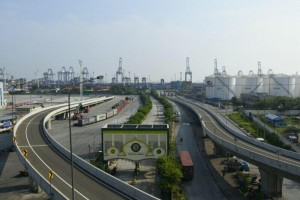Indonesia Competitiveness Ranking Leaps 11 Places This Year
 Infrastructure development has become one of the Working Cabinets priority programs in the President Joko Jokowi Widodo and Vice President Jusuf Kallas administration (2015-2019) aimed at boosting national economic growth and equitable development.
Infrastructure development has become one of the Working Cabinets priority programs in the President Joko Jokowi Widodo and Vice President Jusuf Kallas administration (2015-2019) aimed at boosting national economic growth and equitable development.
Several infrastructure projects which have been completed have also contributed to the increase in Indonesias competitiveness.
Based on country rankings provided by IMD World Competitiveness Center, the Swiss-based international research institution, Indonesias competitiveness in 2019 increased significantly from ranking 32 in 2019 to ranking 43.
The institution assesses economic performance based on economic performance, government efficiency, business efficiency and infrastructure.
Indonesia – which leapt eleven places – enjoyed the biggest improvement in the Asia-Pacific region, thanks to increased efficiency in the government sector as well as improvement in infrastructure and business conditions.
Nevertheless, our ranking is still below that of Malaysia (ranking 22) and Thailand (ranking 25). If we do not improve our infrastructure, Indonesia will be left behind from neighboring countries in term of investment attractiveness, Minister of Public Works and Public Housing Basuki Hadimuljono said.
The Minister added that infrastructure development is the most logical and strategic choice to increase Indonesias competitiveness and to be in par with other countries, not to mention that financial crisis in Indonesia has an impact on postponing and stopping the construction and maintenance of infrastructure.
Therefore, the Government since 2015 has been diverting subsidy expenditure into productive expenditure in the form of infrastructure, health and education development.
Unfortunately, the results of infrastructure development cannot be enjoyed instantly.
Thus, we have developed infrastructure in Papua, West Papua, East Nusa Tenggara Barat, and border areas, he said.
A good competitiveness is needed to attract investment both domestic and international that will increase national production, and open new job opportunities.
With inadequate condition of infrastructure, it will be difficult for Indonesian products to compete. Poor connectivity will make Indonesias logistic cost to be more expensive than those of Malaysia, Singapore, and the Philippines
The Minister went on to say that developing connectivity is done by carrying out a multimodal synergy, for example when the Ministry of Transportation developed airports and seaports, Ministry of Public Works and Public Housing will provide toll roads that connect the airports and seaports.
Budgeting is other challenge for the Government since Ministry of Public Works and Public Housings budget does not meet the need. During a period of 2015-2019, the total budget of the Ministry is Rp548.4 trillion in which Rp119.6 trillion is allocated for 2015, Rp98.1 trillion for 2016, Rp106.3 trillion for 2017, Rp113.7 trillion for 2018, and Rp110.7 trillion for 2019.Therefore, for infrastructure that involves the public such as toll roads, the development is through investment in business entities. Thus, the existing infrastructure budget will be used optimally to develop border areas, remote areas and community infrastructures such as drinking water, sanitation, suspension bridges, and houses for low-income communities. (Ministry of Public Works and Public Housing PR/EN)
Translated by : Rany Anjany Subachrum
Edited by : M. Ersan Pamungkas








